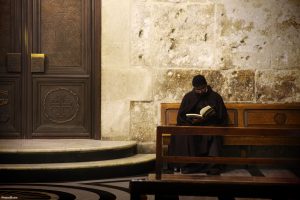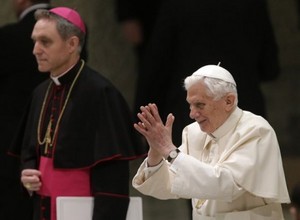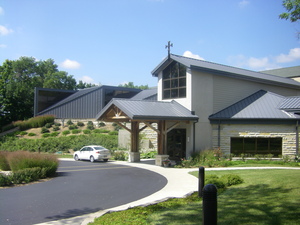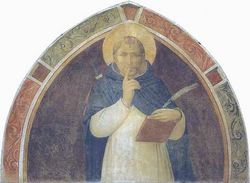Father Boniface Hicks, OSB, a Benedictine monk of Saint Vincent Archabbey in Latrobe, Pennsylvania. He is trained in computer science and in spirituality. Currently, Father Boniface is part of the formation team training men for the Catholic priesthood at his abbey’s seminary and the work of spiritual direction. Since I am interested in Benedictine Spirituality periodically you will see essays on this subject here on Communio. As a side note, those of us who follow Communion and Liberation ought to recognize a connection with what is said here and with what Father Julián Carrón has been teaching in months. That is, the importance of listening, centering on Jesus Christ as a Lord and Savior, and that silence is crucial method. How we respond to the Lord’s invitation to be in friendship with him requires us to be in relation to Him and listen to His promptings through prayer, fasting, alms-giving, sacred scripture, the worthy reception of the sacraments and knowing the faith.
What is said of monks is also true for the Oblates. Attend!

Introduction
“Listen my son to the Master’s instructions and attend to them with the ear of your heart” (Prologue 1). These are the first words Saint Benedict speaks to his monks through his Rule of life. The Rule of Benedict (RB) establishes three important spiritual attitudes already in the first verse. The first instruction is that Saint Benedict requires the monk to listen, which requires the monk to cultivate silence, humility and obedience. The second is that God, the Master, speaks to us—both directly and through those in whom He has invested authority, and even more broadly through the circumstances of reality itself. The third is that there is a kind of listening that one can only do and must do with the ears of the heart. In this post, we will reflect on the first part and take up the next two parts in the following posts.
Listening – “Listen, my son”
Listening is the foundational attitude of the monk and to do it well it requires silence, obedience, and humility. This explains the three chapters of the Rule on these principal monastic attributes—chapter 5 on obedience, chapter 6 on silence and chapter 7 on humility. All are necessary for listening: only the humble man listens, while the proud man believes he already knows everything; listening requires exterior silence to hear with the ears in one’s head and interior silence to hear with the ears of the heart, and obedience treats listening as a path of potential action, not merely a matter of taking in idle words.
Humility is a key theme throughout the Rule of Saint Benedict. The longest chapter in the rule (chapter 7) is devoted to the virtue of humility. Humility is expressed in the beginning of the rule as the call to listen. A person only listens when he believes he has something to learn. Otherwise, he will talk excessively, thinking everyone else has something to learn from him. That is why Saint Benedict warns the talkative man: “in a flood of words, you will not avoid sinning” (RB 7:57 quoting Proverbs 10:19). He also notes that when we think we know everything and never cease talking, we end up going in circles, never making progress: “A talkative man goes about aimlessly on the earth” (RB 7:58 quoting psalm 140:12). Those scriptures are quoted in the ninth step of humility which requires “that a monk controls his tongue and remains silent” (RB 7:56).
The silence of Christian monasticism is not merely an asceticism of self-control or emptying our desires, but rather a posture of listening to a God who speaks. We do not silence ourselves for the sake of being silent, but rather for the sake of hearing more clearly. Our silence is not a matter of isolating ourselves, but rather of opening ourselves. It is relational. Silence is the necessary pre-condition for hearing God and encountering Him in prayer and in life. Too often we make the mistake of getting lost in the world and never slowing down enough or silencing ourselves enough to meet God, to hear Him, and simply to be with Him. God has revealed Himself as the divine Word who has spoken from all eternity and continues to speak to us in a personal relationship. When we slow down, humble ourselves in prayer and open our hearts, we can hear His voice. That has a way of humbling us even more, reducing our inflated egos to nothing. We find ourselves saying like Saint Paul, “Indeed I count everything as loss because of the surpassing worth of knowing Christ Jesus my Lord” (Phil 3:8).
Furthermore, Saint Benedict understands listening as leading to action. He is not content with ideas that never turn into action nor with knowledge that never becomes love. “’Knowledge’ puffs up, but love builds up” (1Cor 8:1). “The Word was made flesh and dwelt among us” (Jn 1:14). It is through obedience that knowledge becomes love and that the Word becomes flesh. That is why Jesus is the ultimate example of obedience. In Him, the Father’s will was made tangible and visible at every moment of His life (cf. 1 Jn 1:1-4). “Consequently, when Christ came into the world, he said, ’Sacrifices and offerings you have not desired, but a body have you prepared for me’” (Heb 10:5). The Word was made flesh so that the Father’s will could be visible in a human body. Furthermore, the ultimate sacrifice is made through that same human body. There is no love without sacrifice and Christ revealed the ultimate love by offering the ultimate sacrifice. He laid down His life for us, allowing His crucified Body to proclaim, through suffering, all of the Father’s love for us. When Jesus listened to the Father, He opened His life to the greatest potential. This potential became a reality as His Body participated in and revealed the fullness of divine love. This is true obedience and Saint Paul glorifies it by singing: “Christ…became obedient unto death, even death on a cross” (Phil 2:8).
We can now apply to ourselves Saint Benedict’s teaching on listening through silence, obedience, and humility. We must create places of silence and we must intentionally include in our lives extended periods of silence for prayer. In the rule, Saint Benedict prescribes 4-6 hours of silence for monks to spend each day in personal prayer. This sets a high standard that few can follow given the demands of daily life, but at least an hour of daily silent prayer is necessary for real spiritual growth.
Beyond our dedicated times of silent prayer, it also helps to create spaces of communal silence. Benedictine monasteries have done this since the 6th century, making a place not only for the personal sanctification of the monks but also for other members of the faithful to enter into. Saint Benedict had extensive regulations in the Rule to provide for guests, noting that “monasteries are never without them” (RB 53:16). The service of hospitality is a key feature of Benedictine spirituality. When Benedictine monasteries consist of monks that are prayerful and cultivate silence, these monasteries can become a spiritual oasis for the faithful. That depends on the personal decision of the monks, however. We must all choose how we will respond to the call of the Christian faith. When we respond with humble silence and holy love, our hearts are set aflame and we can warm the hearts of others. When we allow the noise of the world to come in and to corrupt our souls and make us busybodies, our hearts grow cold and so do those who would seek the warmth of Christ in us.
This post originally appeared on fatherboniface.org











